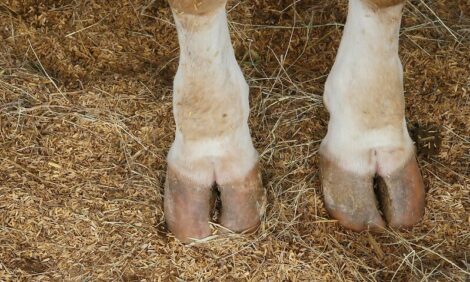



K-State launches research center for vaccine development
Jishu Shi will serve as directorKansas State University's College of Veterinary Medicine has announced the launch of the new Center on Vaccine Evaluation and Alternatives for Antimicrobials, or CVEAA, to support animal vaccine development and usage.
Jishu Shi, professor of vaccine immunology and one of the university's leading researchers on infectious swine diseases, will serve as the center's director and one of three primary faculty members. The new center will provide innovative services to global partners and customers by conducting safety and efficacy evaluations of vaccines for transboundary animal diseases, helping animal vaccine buyers manage product specification and quality evaluation, and leading feasibility analysis and policy advocacy on vaccines as alternatives for antimicrobials used in animal production.
"The Center on Vaccine Evaluation and Alternatives for Antimicrobials is a research and service center designed to meet a series of unmet needs in the development and usage of animal vaccines around the world," Shi said.
In addition to research projects supported by the US Department of Agriculture and Department of Homeland Security, the centre will work closely with animal health industry partners to test the safety and efficacy of experimental vaccines for African swine fever, classical swine fever and porcine reproductive and respiratory syndrome. It will also co-develop novel adjuvants for animal vaccines. The centre will also work to evaluate diagnostic tools for swine infectious diseases, novel antiviral compounds against swine viral pathogens, and novel disinfectants against African swine fever virus and other swine viral pathogens.
"Dr. Shi's research expertise in helping control the spread of African swine fever and his experience in building coalitions between a wide variety of partners in private industry and government agencies makes him uniquely qualified to lead this new center," said Bonnie Rush, Hodes family dean of the College of Veterinary Medicine. "He has already assembled an impressive team of research scientists who will serve on an advisory board for the center, and he has identified several opportunities for collaboration in the short time since the center was established."
Joining Shi as primary faculty members for the center are Lihua Wang, research assistant professor of virology and vaccine immunology, and Rachel Madera, senior research scientist in anatomy and physiology. The center also consists of the following collaborating principal investigators from K-State's veterinary college: Jianfa Bai, Santosh Dhakal, Natasha N. Gaudreault, Tae Kim, Waithaka Mwangi, Roman M. Pogranichniy, Jürgen A. Richt and Dana L. Vanlandingham.
"The need to evaluate safety and efficacy of experimental vaccines for high consequence transboundary animal diseases has increased significantly since 2018, but the availability of suitable high-level biosecurity research facilities and associated expertise in public and private domains is very limited," Shi said. "Vaccines for transboundary animal diseases are frequently procured by international aid agencies. However, these agencies have very limited resources on 'fit for purpose' analysis and quality evaluation of the vaccines before they are purchased."
Shi said the 'One Health' initiative — promoting vaccines as alternatives to antibiotics in food animal production practice — has faced multiple challenges, including the efficacy, availability and affordability of current commercial bacterial vaccines.
"New policies and public-private partnerships are needed to accelerate targeted research and development of new vaccines to improve animal health and reduce antibiotic consumption and antimicrobial resistance risks," Shi said.



